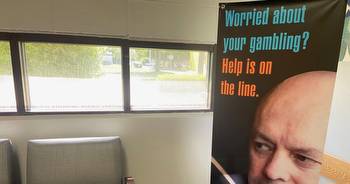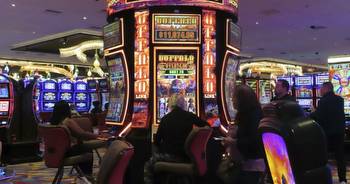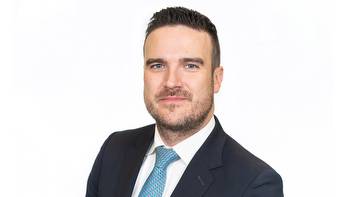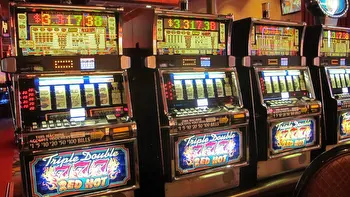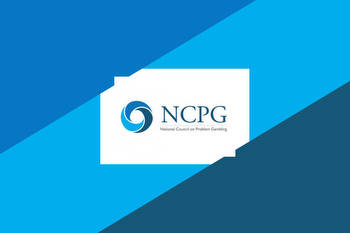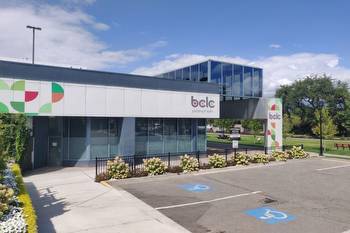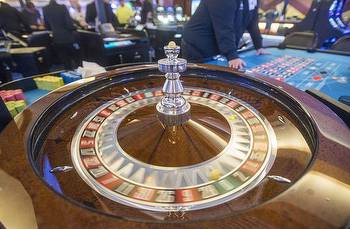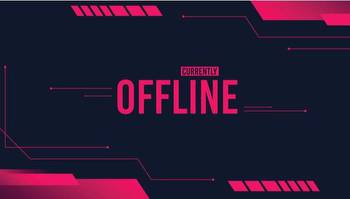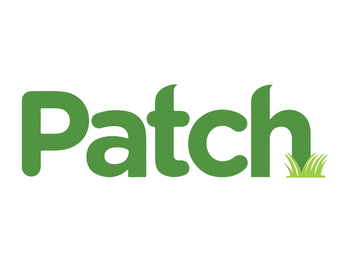Gambling is easier than ever. That's not the case for finding gambling addiction help

The opportunity to gamble is no farther away than your phone, but treatment for gambling addiction is much harder to find.
JUANA SUMMERS, HOST:
It has never been easier to gamble in the U.S. Almost every state allows some sort of wagering, and sports or online betting is legal in most of the country. An estimated 2% of the population has a gambling disorder. Only a very few get treatment. And that's why advocates are pushing for better access to help and a more unified national effort. New England Public Media's Karen Brown reports.
(SOUNDBITE OF CASINO MACHINES CHIMING)
KAREN BROWN, BYLINE: At the MGM casino in Springfield, Mass., a 60-year-old regular named Monroe is sitting in an electronic craps machine.
MONROE: Let's see if I can win this one. All behind the nine. Seven, I win. Nine, I lose (laughter).
BROWN: He chooses machines that allow small bets for 1 or $5 at a time.
MONROE: Now I'm going to take my money out and just walk around with my $12 and be happy.
BROWN: It didn't used to be that way. Monroe asked to keep his last name private because he has a history of gambling addiction. For years, he would come to the casino in the morning and stay - he doesn't even know how long.
MONROE: It's like, do you want to go outside and see the sun? No, I'm down. I got to get my money back. Get your money back. It's, like, I got to get more. And that's how you know when you got a problem, when you ain't got nothing time for nothing else.
BROWN: Monroe now gambles on a budget - $50 a day. But that didn't come easily. For a time, he would keep his money in his socks to make it harder to overspend. It never occurred to him to get formal treatment, and he didn't know where to get it anyway. That's pretty common, says Keith Whyte of the National Council on Problem Gambling.
KEITH WHYTE: Yeah, right now we're still kind of sitting back and making problem gamblers work hard to find the help that is available. That doesn't work well for any other addiction.
BROWN: Between casinos, the lottery and now sports and mobile betting, no one in America is far from some form of legal gambling. As a result, researchers estimate around 7 million people have a gambling disorder - the kind that ruins finances, relationships and jobs. Yet fewer than 1% of them are in treatment.
WHYTE: Problem gambling is not like other things where if you build it, they will come.
BROWN: Whyte says gamblers are notoriously reluctant to seek help, so relatively few providers offer it, which, in turn, makes it hard to find. And there's no national office for gambling addiction as there is for drugs and alcohol, even though it's been listed in the Diagnostic Manual of Psychiatry for more than 40 years.
EMILY BRUNNER: It's actually quite a horrifyingly potent disease state in the sense that it's more associated with suicide than any of the other addictions.
BROWN: Dr. Emily Brunner is a gambling specialist on the board of the American Society of Addiction Medicine. Most of her gambling patients started out seeking help for drug or alcohol addiction. She then treats them with a combination of cognitive behavioral therapy and medications that reduce cravings. But no medication is FDA-approved for gambling. And without a national research arm, she says the body of knowledge is thin.
BRUNNER: I do think addiction doctors are very interested in addressing it better and learning more about it. But, you know, there aren't very many of us, and we have a lot of competing priorities.
BROWN: And while gambling can trigger a neurobiological dependence like substance use, Keith Whyte says it's often considered an issue of morality or even skill among doctors as well as gamblers themselves.
WHYTE: They think maybe I am a bad gambler. I didn't concentrate hard enough on the cards.
BROWN: That's the rabbit hole Ted Hartwell went down for decades. When he was a kid in Lubbock, Texas, coping with his parent's difficult divorce, he spent weekends with his father at the racetrack.
TED HARTWELL: My dad would give each of the kids $20, and that was ours to wager on the horses.
BROWN: Over time, he moved to Las Vegas and got heavily into slot machines and poker. He took out payday loans and opened secret credit cards.
HARTWELL: It seemed like the only way I was going to get out of the mess was to gamble higher limits and hit that major jackpot, so I could pay off all this hidden debt before anybody found out about it.
BROWN: He says he still didn't think he had a problem until his wife figured out he'd lost a quarter of a million dollars over 10 years.
HARTWELL: I thought I was on the verge of losing my family, losing access to my little girl, who was 2 years old at that time. For the very first time, I recognized that this was something I needed help for.
BROWN: But he still didn't know how to get it. First stop was a 12-step program that didn't help. He went to a general therapist who had no training in gambling addiction. He picked up a brochure with the 800-GAMBLER hotline number.
HARTWELL: And either hung up or pretended I had the wrong number a couple times.
BROWN: Finally, he found an intensive outpatient program specifically for gambling addiction and hasn't gambled in 15 years. Now, he works for the Nevada Council on Problem Gambling, where he advocates for better access to treatment. He says there are only about 30 gambling-certified counselors in all of Nevada. The state spends a total of $2 million to address problem gambling, which is a tiny fraction of what the gambling industry brings in.
HARTWELL: Some states have no state funding for the issue at all.
BROWN: But funding alone doesn't always solve the problem. Take Massachusetts, which earmarks $24 million a year for problem gambling, yet only 150 therapists in the state are gambling-certified, and many don't actually offer treatment. Some clinics even ended their gambling programs. They say clients weren't asking for it.
(SOUNDBITE OF ARCHIVED RECORDING)
UNIDENTIFIED PERSON #1: Download the DraftKings Sportsbook app. Bet just $5 to get 200 in bonus bets...
BROWN: And now a younger generation is being drawn into sports betting.
(SOUNDBITE OF ARCHIVED RECORDING)
UNIDENTIFIED PERSON #2: With live betting on every NFL game.
BROWN: Phil Sherwood is with the nonprofit Massachusetts Council on Gaming and Health.
PHIL SHERWOOD: These are folks who have never played on a slot machine, never scratched a scratch ticket. They placed their first bet when sports betting became legal, and then six weeks later, they're in trouble.
BROWN: Given that sports betting companies are all over the internet and airwaves, even partnering with colleges, Sherwood says there should be as much effort to recruit new therapists and promote gambling help lines.
SHERWOOD: Whether it be in barbershops in urban areas, but on billboards in high-traffic areas.
BROWN: And many experts recommend more screening at drug recovery programs or credit agencies to find people at risk of gambling problems.
MONROE: Oh, come on, come on. Let's see. See this. See this. If I get this...
BROWN: Even if, like Monroe in Springfield, players don't always recognize the signs.
MONROE: Only time we're in trouble is when we ain't got no money. That's how they feel.
BROWN: Monroe says he can live with his current habit - around $300 a week. But he never wants to go back to the darkest days of his addiction.
MONROE: And believe me, I got some horror stories to tell, but I'm going to keep to the grave because it was that bad.
BROWN: Advocates are now pushing for legislation that would create a national funding stream to study problem gambling. Meanwhile, they want states to better regulate new forms of gambling to prevent addiction in the first place. Public health workers call that putting up fences at the top of the hill, rather than ambulances at the bottom.
For NPR News, I'm Karen Brown.
(SOUNDBITE OF ERIC TUCKER SONG, "FWM (FEAT. FRE$H)")











